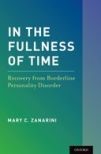 In the Fullness of Time: Recovery from Borderline Personality Disorder
In the Fullness of Time: Recovery from Borderline Personality Disorder
Contents
-
-
-
-
-
-
Small-Scale, Short-Term, Prospective Studies of the Course of BPD Small-Scale, Short-Term, Prospective Studies of the Course of BPD
-
The Early Studies: 1960s–1970s The Early Studies: 1960s–1970s
-
Studies Conducted in the 1980s Studies Conducted in the 1980s
-
Small Studies During the 1990s Small Studies During the 1990s
-
-
Lessons Learned from Short-Term Studies Lessons Learned from Short-Term Studies
-
Large-Scale, Long-Term, Follow-Back Studies of the Course of BPD Large-Scale, Long-Term, Follow-Back Studies of the Course of BPD
-
Lessons Learned from the Follow-Back Studies Lessons Learned from the Follow-Back Studies
-
-
-
-
-
-
-
-
-
-
-
-
-
-
-
-
-
-
-
3 C3Earlier Studies of the Longitudinal Course of BPD
Get access-
Published:October 2018
Cite
Abstract
This chapter reviews the findings of 17 small-scale prospective follow-up studies of the short-term course of BPD. It also reviews the findings of four large-scale follow-back studies of the long-term course of BPD. The results of these small-scale prospective studies have been taken to mean that most borderline patients are doing relatively poorly a mean of one to seven years after study entry. The results of these large-scale follow-back or retrospective studies, which diagnosed subjects by chart review, found that, on average, subjects were doing reasonably well a mean of 14–16 years after their index admission. The strengths and limitations of these early studies of the course of BPD will be reviewed, as well as detailed findings from each study; findings pertaining, where available, to the symptoms of BPD, co-occurring disorders, psychosocial functioning, and psychiatric treatment.
Sign in
Personal account
- Sign in with email/username & password
- Get email alerts
- Save searches
- Purchase content
- Activate your purchase/trial code
- Add your ORCID iD
Purchase
Our books are available by subscription or purchase to libraries and institutions.
Purchasing information| Month: | Total Views: |
|---|---|
| October 2022 | 1 |
| April 2023 | 3 |
| August 2023 | 3 |
| November 2023 | 2 |
| February 2024 | 3 |
| April 2024 | 2 |
| June 2024 | 1 |
| August 2024 | 2 |
| September 2024 | 4 |
Get help with access
Institutional access
Access to content on Oxford Academic is often provided through institutional subscriptions and purchases. If you are a member of an institution with an active account, you may be able to access content in one of the following ways:
IP based access
Typically, access is provided across an institutional network to a range of IP addresses. This authentication occurs automatically, and it is not possible to sign out of an IP authenticated account.
Sign in through your institution
Choose this option to get remote access when outside your institution. Shibboleth/Open Athens technology is used to provide single sign-on between your institution’s website and Oxford Academic.
If your institution is not listed or you cannot sign in to your institution’s website, please contact your librarian or administrator.
Sign in with a library card
Enter your library card number to sign in. If you cannot sign in, please contact your librarian.
Society Members
Society member access to a journal is achieved in one of the following ways:
Sign in through society site
Many societies offer single sign-on between the society website and Oxford Academic. If you see ‘Sign in through society site’ in the sign in pane within a journal:
If you do not have a society account or have forgotten your username or password, please contact your society.
Sign in using a personal account
Some societies use Oxford Academic personal accounts to provide access to their members. See below.
Personal account
A personal account can be used to get email alerts, save searches, purchase content, and activate subscriptions.
Some societies use Oxford Academic personal accounts to provide access to their members.
Viewing your signed in accounts
Click the account icon in the top right to:
Signed in but can't access content
Oxford Academic is home to a wide variety of products. The institutional subscription may not cover the content that you are trying to access. If you believe you should have access to that content, please contact your librarian.
Institutional account management
For librarians and administrators, your personal account also provides access to institutional account management. Here you will find options to view and activate subscriptions, manage institutional settings and access options, access usage statistics, and more.